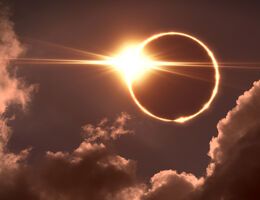Health library
Back to health libraryKeep your eyes safe during the solar eclipse

April 1, 2024—If you're planning to watch the solar eclipse on April 8, plan now how to protect your eyes. Looking directly at the sun can cause permanent eye damage. (The sole exception is during totality, when the moon completely covers the sun.)
Here's what you need to know, according to NASA, the American Academy of Ophthalmology (AAO) and the American Optometric Association.
Use proper protection
Normal sunglasses—no matter how dark they are—won't protect your eyes during an eclipse. Instead, use glasses or a handheld viewer specially designed for eclipse viewing. They're thousands of times darker than regular sunglasses, and they can protect your eyes from serious, permanent damage, called solar retinopathy.
Before you put on your eclipse glasses, remember this advice:
- Read and follow all instructions that came with the glasses or viewer.
- Check that they comply with the worldwide safety standard, known as ISO 12312-2.
- Make sure the lenses aren't scratched, torn or damaged. If they are, don't use them.
- If you normally wear glasses, choose eclipse glasses or a viewer that can fit over the top.
- Only remove your eclipse glasses or viewer during totality or when you're not looking at the sun.
If you don't have eclipse glasses, use an indirect viewing method. Make a pinhole projector or use a colander from your kitchen to project shadows onto the ground. Or check out a livestream online.
Also important to know: Looking at the sun through binoculars, telescopes or a camera viewfinder can hurt your eyes—even with eclipse glasses in place, according to the AAO. If you plan to take photos, make sure your camera lens is covered by a solar filter.
Signs you may have eye damage
Eclipse eye damage likely won't cause pain or other symptoms right away, according to the AAO. This is because the retinas don't have nerves that send pain signals when they're damaged. Instead, you might notice symptoms a few hours after the eclipse.
Watch for:
- Blurry or distorted vision.
- Headache.
- Blind spots in one or both eyes.
- Increased sensitivity to light.
- Changes to the way you see colors.
If you notice signs of a vision problem, let your eye doctor know right away. While there's no treatment for solar retinopathy, they can assess the damage and offer advice to support your eye health.
Don't forget sunscreen
Your eyes aren't the only part of you that needs sun protection. While you're out viewing the eclipse, you may be in direct sunlight for several hours. To protect your skin, make sure to wear sunscreen or keep your skin covered.
Sources
- American Academy of Ophthalmology. "How to Photograph an Eclipse (Video)." https://www.aao.org/eye-health/tips-prevention/how-to-photograph-eclipse.
- American Academy of Ophthalmology. "Solar Eclipse Eye Safety." https://www.aao.org/eye-health/tips-prevention/solar-eclipse-eye-safety.
- American Academy of Ophthalmology. "Think You Hurt Your Eyes Watching the Eclipse?" https://www.aao.org/eye-health/tips-prevention/think-you-hurt-your-eyes-watching-eclipse.
- American Association for Pediatric Ophthalmology and Strabismus. "How to Safely View a Solar Eclipse." https://aapos.org/glossary/how-to-safely-view-a-solar-eclipse.
- American Astronomical Society. "Eyewear and Handheld Viewers." https://eclipse.aas.org/eye-safety/eyewear-viewers.
- American Optometric Association. "Solar Eclipses and Eye Safety." https://www.aoa.org/healthy-eyes/caring-for-your-eyes/solar-eclipses?sso=y.
- NASA. "Eclipse Safety." https://science.nasa.gov/eclipses/safety.
